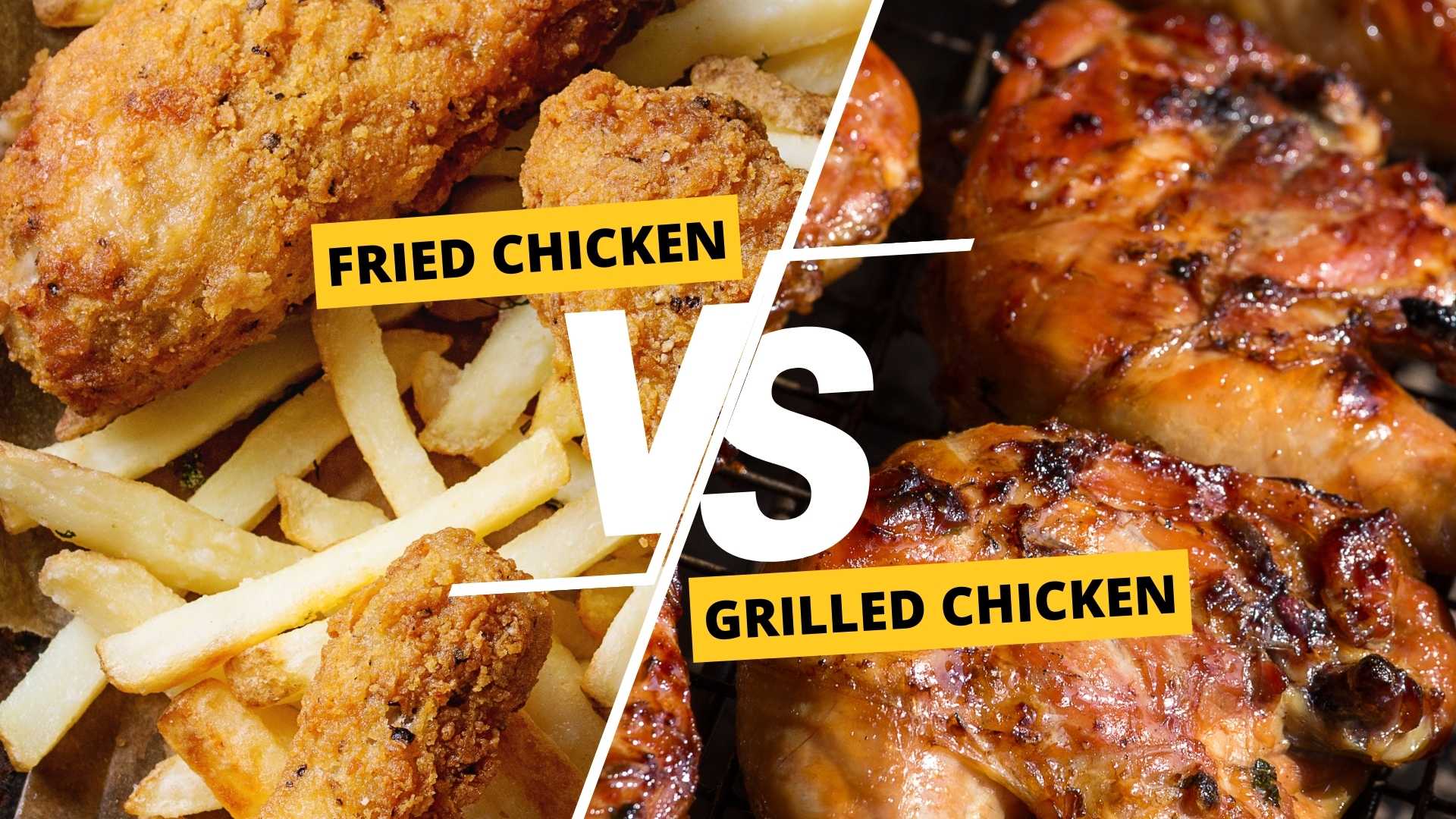Chicken is one of the most popular types of meat worldwide, and it can be prepared in a variety of ways, including frying and grilling. While fried chicken is a classic comfort food and a staple of fast food restaurants, grilled chicken is often touted as the healthier option. But is that really the case?
In this article, we’ll explore the nutritional differences, taste and texture variations, and cooking process and convenience of fried and grilled chicken, and help you make an informed decision about which one is the right choice for you.
Fried vs. Grilled Chicken: Which One is Healthier for You?
Nutritional Differences
When it comes to the nutritional value of fried vs. grilled chicken, there are some significant differences to consider. Let’s take a look at the breakdown:
Fried Chicken:
- High in calories: On average, a piece of fried chicken contains around 200-250 calories, with larger pieces like thighs and wings containing even more.
- High in fat: Fried chicken is often deep-fried, which means it absorbs a lot of oil, resulting in a high-fat content. The breading and skin also contribute to the fat content.
- High in sodium: Fried chicken is often seasoned with a lot of salt, which can contribute to high blood pressure and other health issues.
- Low in nutrients: Fried chicken is not a good source of vitamins or minerals, as the breading and frying process can strip the chicken of its nutrients.
Grilled Chicken:
- Lower in calories: On average, a piece of grilled chicken contains around 120-150 calories, making it a good option for those watching their calorie intake.
- Lower in fat: Grilled chicken is a leaner protein option, with less fat content than fried chicken.
- Lower in Sodium: Grilled chicken can be seasoned with herbs and spices rather than salt, making it a lower-sodium option.
- Higher in nutrients: Grilled chicken retains more of its nutrients than fried chicken, making it a better source of vitamins and minerals.
Overall, it’s clear that grilled chicken is the better choice when it comes to nutritional value. However, it’s important to note that not all grilled chicken is created equal – marinating and seasoning can add calories and sodium, so be sure to check the nutrition information before making your selection.
Taste and Texture
While nutritional value is an important factor to consider, it’s not the only one. Taste and texture are also important considerations when deciding between fried and grilled chicken.
Fried Chicken:
- Crispy and crunchy: Fried chicken is known for its crispy and crunchy texture, thanks to the breading and deep-frying process.
- Juicy: Despite the crispiness, fried chicken can still be juicy and tender on the inside.
Flavorful: The breading and seasoning on fried chicken can give it a rich and savory flavor.
Grilled Chicken:
- Juicy and tender: Grilled chicken can also be juicy and tender but without the crispy exterior.
- Smoky and flavorful: Grilled chicken can have a smoky flavor from the grill and can be seasoned with a variety of herbs and spices.
When it comes to taste and texture, the choice between fried and grilled chicken ultimately comes down to personal preference. If you love the crispy texture and rich flavor of fried chicken, it might be worth indulging in occasionally. On the other hand, if you prefer a lighter and more flavorful option, grilled chicken is the way to go.
Cooking Process and Convenience
The cooking process and convenience of fried and grilled chicken are also important factors to consider when making your selection.
Fried Chicken:
- Easy to prepare: Fried chicken is relatively easy to prepare at home, with many recipes available online or in cookbooks.
- Requires special equipment: To deep-fry chicken, you’ll need a large pot or fryer and oil, which can be messy and potentially dangerous if not used properly.
- Time-consuming: The frying process can take 20-30 minutes or longer, and you’ll need to wait for the oil to cool before disposing of it.
- Availability: Fried chicken is widely available at fast food restaurants and some grocery stores, making it a convenient option when you’re short on time.
Grilled Chicken:
- Easy to prepare: Grilled chicken is relatively easy to prepare at home, with many recipes available online or in cookbooks.
- Requires a grill: To grill chicken, you’ll need access to a grill, either an outdoor grill or an indoor grill pan.
- Quick: Grilled chicken can be cooked in as little as 10-15 minutes, making it a quick and easy option for weeknight meals.
- Versatile: Grilled chicken can be served on its own or in a variety of dishes, making it a versatile ingredient to have on hand.
Overall, both fried and grilled chicken have their pros and cons when it comes to convenience. If you have access to a grill and prefer a quick and easy option, grilled chicken might be the way to go. If you’re short on time and need a quick meal, or if you’re craving the indulgent flavor of fried chicken, it might be worth picking up a bucket of chicken from your local fast food joint.
Conclusion
So, which is the healthier option – fried chicken or grilled chicken? It’s clear that grilled chicken is the winner when it comes to nutritional value, with fewer calories, less fat, and more nutrients than fried chicken. However, taste and texture preferences, as well as convenience factors, also come into play when making your selection.
Ultimately, the choice between fried and grilled chicken comes down to personal preference and balance. If you love the flavor and texture of fried chicken, it’s okay to indulge in moderation. However, if you’re looking for a healthier option, grilled chicken is the way to go. By making informed choices about your food, you can enjoy the delicious taste of chicken without sacrificing your health.

